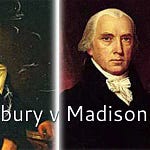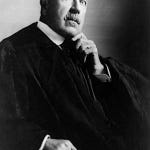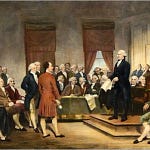On this day in legal history, October 3, 1965, President Lyndon Johnson signed into law the Immigration and Nationality Act of 1965.
The Immigration and Nationality Act of 1965, also known as the Hart-Celler Act, marked a shift in U.S. immigration policy. Signed into law by President Lyndon B. Johnson, the act abolished the National Origins Formula, which had been in place since the 1920s and favored immigration from Western and Northern Europe. This change came during the height of the Civil Rights Movement and was seen as a step toward ending racially discriminatory immigration policies. The act introduced a seven-category preference system that prioritized family reunification, professionals with specialized skills, and refugees.
Before the 1965 act, U.S. immigration policy was heavily skewed towards preserving American homogeneity. Laws like the Chinese Exclusion Act of 1882 and the Immigration Act of 1924 had been enacted to limit immigration from Asia, Southern Europe, and Eastern Europe. The 1965 act was a response to both domestic and international pressures to end such discriminatory practices. It received bipartisan support, although there was notable opposition from Southern Democrats.
For the first time, the act also set a numerical limit on immigration from the Western Hemisphere, capping it at 120,000 per annum. The immediate effect of the act was a diversification of the immigrant population in the U.S., with increased numbers coming from Asia, Africa, and Eastern and Southern Europe. Despite its progressive steps, the act did not fully eliminate discrimination; for instance, members of the LGBTQ+ community were still denied entry on the grounds of being "mentally defective" until the Immigration Act of 1990.
The act was signed into law at the foot of the Statue of Liberty, symbolically ending preferences for white immigrants that dated back to the 18th century. It laid the groundwork for the multicultural society that the United States is today, although it was not without its critics and limitations.
Kirkland & Ellis, the world's leading law firm in terms of revenue, has set a new record by promoting 205 attorneys to partnership, effective October 1. This marks the sixth consecutive year the firm has broken its own record, with 193 lawyers promoted last year and 151 the year before that. Over the past decade, the size of the firm's partnership class has surged by more than 156%, growing from 80 new partners in 2013 to over 200 in 2023. The firm, founded in Chicago, reported a gross revenue of $6.5 billion in 2022 and profits per equity partner exceeding $7.5 million. Kirkland & Ellis also maintains a large tier of nonequity partners, distinguishing it as the most successful firm with such a structure.
Kirkland & Ellis Promotes the Largest Class Ever to Partnership
X Corp., formerly known as Twitter Inc., is facing a trademark infringement lawsuit filed by X Social Media LLC in a Florida federal court. The lawsuit alleges that X Corp. was aware of X Social Media's pre-existing rights to the "X" trademark before undergoing a rebranding campaign in July, led by owner Elon Musk. The rebranding has caused confusion among consumers, leading them to believe that X Social Media is associated with X Corp., according to the complaint. The name change is said to be "financially and strategically harmful" to X Social Media, which claims to have already lost revenue due to the rebranding.
Founded in 2015, X Social Media specializes in connecting law firms with clients through social media platforms. The company has invested over $2 million in building its brand and owns the federal trademark registration for "X SocialMedia," which it has used continuously for five years. The letter "X" in its name symbolizes the "beginning of a life-changing journey towards justice," according to the company.
X Social Media sent a cease-and-desist letter to X Corp. in August, but the latter refused to comply. X Corp. has also applied for seven trademark registrations with the US Patent and Trademark Office. The lawsuit against X Corp. is not an isolated incident; other tech companies have faced similar legal challenges following rebranding efforts. For example, Meta Platforms Inc.'s 2021 name change from Facebook led to multiple lawsuits, including from a VR company and a blockchain group. Similarly, Block Inc., formerly Square, settled a trademark dispute with H&R Block Inc. earlier this year.
Musk’s X Corp. Sued Over Trademark by Legal Marketing Firm (1)
Elon Musk's X hit with trademark lawsuit from marketing agency | Reuters
The civil fraud trial against former U.S. President Donald Trump has commenced in New York, with the state's Attorney General Letitia James accusing Trump of generating over $100 million through fraudulent means related to his real estate empire. James is seeking at least $250 million in fines and a permanent ban on Trump and his sons from running businesses in New York. The case revolves around allegations that Trump inflated the value of his assets and net worth between 2011 and 2021 to secure favorable bank loans and lower insurance premiums.
Trump has vehemently denied the allegations, calling the case a "scam" and a "sham," and accusing James and the presiding judge, Arthur Engoron, of political bias. Engoron is hearing the case without a jury and last week found Trump and his companies liable for fraud, including inflating the value of assets like Trump Tower and Mar-a-Lago. The trial will also review six additional claims, including falsifying business records and insurance fraud.
The state's first witness was Donald Bender, a partner at Mazars USA and a longtime accountant for Trump's businesses. Bender testified that he relied on information provided by Trump and his companies when compiling Trump's personal financial statements. More than 150 people, including Michael Cohen, Trump's former personal lawyer, could testify in the trial, which is expected to run through early December.
Trump's legal team countered that his financials were entirely legal and that there was no intent to defraud. They argued that disagreements over asset valuations do not necessarily constitute fraud. This trial is one of several legal challenges Trump is currently facing, including criminal charges in Washington, Georgia, Florida, and New York for various alleged offenses. Trump has denied all wrongdoing and pleaded not guilty in all cases.
Trump reaped over $100 million through fraud, New York says as trial starts | Reuters













